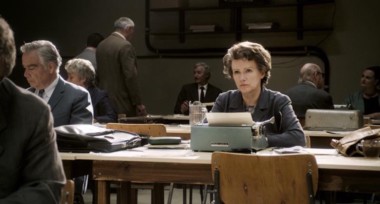For all the World War II stories our filmmakers have told over the years, some of the most dramatic stories to emerge from that time came in the years that followed the war itself. One of those was the capture and subsequent trial of Adolf Eichmann. The architect of Germany’s deportation system, he fled the country (under a Vatican passport) after escaping from an American internment camp at the end of the war. He landed in Argentina, where he lived until 1960, when he was captured by agents of Israel’s Mossad and brought to Jerusalem to stand trial, which he did in a bulletproof glass booth.
One of the reporters at that trial was Hannah Arendt, a German-Jewish philosopher whose reportage for The New Yorker catapulted her to worldwide fame, and, in some circles, infamy. Margarethe von Trotta’s new film—titled simply Hannah Arendt, and screening now at Amherst Cinema—tells her tale. Using actual footage from the trial, von Trotta concentrates her biography of Arendt on those years, during which she first established her concept of the “banality of evil,” a turn of phrase that grew out of what she saw in Eichmann: a bureaucrat whose mindless obedience and thoughtlessness (Gedankenlosigkeit) paved the way for our history’s horror.
For many, however, that was too close to letting the monster off the hook. Their outrage only hardened when she also laid blame on the local Jewish councils (Judenrat) that were established during wartime—“undoubtedly the darkest chapter of this whole dark story,” she wrote. They were composed of local Jewish leaders and tasked with getting the communities to comply with Nazi regulations, and Arendt saw in their actions a betrayal that led to more Jewish deaths.
But while her ideas were inflammatory—even today, they can cause heated debate among old friends—there is no doubt that they changed the way the world thinks about evil. When next we face some unimaginable despair, and being human makes it nearly inevitable, Arendt’s work will help us make sense of it.
Also this week: it’s a time for old favorites around the Valley. No fewer than four cinematic landmarks get the big screen treatment in the next few days, screening from Hadley to Shelburne and offering something for just about any film fan. Mark your calendars—things are about to get busy.
First up is David Lean’s (Oliver Twist) 1962 masterwork Lawrence of Arabia, which Amherst is screening Thursday, July 11 at 7:30 p.m. At 216 minutes, this 50th anniversary restoration is not for the faint of heart, but the tale of T.E. Lawrence’s military career remains one of cinema’s most gripping blends of biography, travelogue and war story. Covering a period from 1916 to 1918, Lean’s film stars Peter O’Toole in the title role as the man whose immersion in the desert conflict of the time earned him his honorific. Co-stars Anthony Quinn and Omar Sharif are on board as the “Arabia” half of the title. Quinn, of course, was Mexican, but he also played Zorba the Greek and an Italian mobster, so who’s counting?
The next two nights, you can head to Shelburne Falls to catch the “comedy horror rock musical” Little Shop of Horrors. Presented by Pothole Pictures, this 1986 adaptation, directed by Frank Oz (The Muppets), features Rick Moranis as the wallflower florist Seymour, who brings in a strange new plant named Audrey that turns out to be less plant and more alien species—one that thrives on human blood. With Steve Martin and Bill Murray on hand to help out, the cast manages to balance laughter and song in a way that precious few films do anymore. To help make the Broadway connection, Friday night’s show will be preceded by a selection of show tunes performed by Natural Music School.
And on Sunday, it’s back to Amherst to pick up with the theater’s Martin Scorsese film festival. This week brings in Taxi Driver, the gritty, paranoid 1976 film that somehow became a popular success if not quite an outright hit. Scorsese regular Robert De Niro stars as a taxi driver who takes on what he sees as the scum of his New York. A deluded knight, he fixates on a young prostitute (Jodie Foster) until his compulsion to save her from her life on the streets boils over into violence. The film is still remarkable not only for its blunt immediacy but also for its strong supporting cast; keep an eye out for the late Peter Boyle, best known today for his turn as Frank Barone, the cantankerous father-in-law on Everybody Loves Raymond, as De Niro’s fellow taxi driver and confidante Wizard.•
Jack Brown can be reached at cinemadope@gmail.com.



